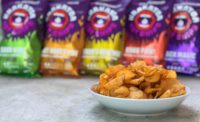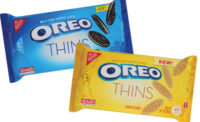Tortilla chips are a party staple. And while traditional versions still soundly resonate with the masses, chip manufacturers have been experimenting with new and interesting flavors, as well as better-for-you versions like organic options and chips based on vegetables or legumes.
Market data
By looking at data from IRI, Chicago for the 52 weeks ending May 31, 2019, the tortilla/tostada chips segment was up by 4.9 percent, taking in $5.5 billion. That tracks well with the overall salty snacks category, which likewise grew 4.9 percent to $24.9 billion.
Overview | Chips | Puffed/Extruded Snacks | Popcorn | Snack Mixes & Nuts | Tortilla Chips | Pretzels | Frozen Snacks | Crackers
Frito-Lay, with its iconic Doritos and Tostitos brands, is the perennial segment leader. Doritos took in $2.4 billion, with an increase of 6.8 percent. Tostitos took in $652.2 million, with an increase of 2.1 percent. Tostitos Scoops followed, with 1.1 percent growth to $484.3 million. Doritos Organic tortilla chips were up by 129.6 percent, with $30.2 million in sales. Tostitos restaurant-style tortilla chips were up by a whopping 450.2 percent, with $29.5 million in sales.
Barcel USA, part of Grupo Bimbo, had another great year for its Takis Fuego products, up 18.7 percent to $366.6 million.
Other strong performers included Late July Organic, part of Campbell Soup Co., up 15.5 percent to $50.7 million, and conventional Late July tortilla chips, up 35.6 percent to $27.5 million. Juanita’s tortilla chips, from Juanita’s Fine Foods out of Hood River, OR, was up 14.9 percent to $34.3 million.
Looking back
A top trend in tortilla chips today is the increasing presence of “good” snacks, says Arnulfo Ventura, CEO/chief bean aficionado, Beanfields, Culver City, CA. “Snacking occasions are on the rise, and consumers today, especially millennials, are looking for their snack brands to provide more sustenance and, ultimately, rid the guilt.”
Tortilla chips—including the growing private label sector—have been embracing better-for-you and clean-label trends. In October 2018, ALDI released its SimplyNature Organic Tortilla Chips, available in Blue Corn and Multigrain varieties.
In February 2019, REAL FOOD FROM THE GROUND UP released its Cauliflower Tortilla Chips. All of its snacks are Non-GMO Project Verified, gluten-free and made with vegan ingredients. In addition to cauliflower, the tortilla chips include cassava.
Another top trend is to customize the eating experience, says Ricardo Rodriguez, marketing manager, confectionary and bakery, Ingredion Incorporated, Westchester, IL. “This can be done by creating textures consumers prefer. In a recent proprietary study that Ingredion contracted with consumers, 79 percent picked crispiness as the top textural attribute for tortilla chips, with crunchiness coming in a close second at 72 percent. In the same study, 54 percent of consumers preferred a thinner tortilla chip.” Ingredion recently launched a broad line of texturizers under the PRECISA Crisp brand that can create differentiated textures in tortilla chips, whether you want a crispier or a crunchier chip, or a completely new texture, he notes.
The tortilla chip category is constantly evolving as new trends emerge, says Theresa Miller, strategic growth and business director, Late July Snacks, Norwalk, CT. “For example, many companies are introducing culinary-inspired products to keep up with today’s ingredient-driven snack trends.” She notes that Late July will have a Clásico line extension in 2019 that puts flavorful ingredients front and center. “Our new variety will pair Late July staples like organic yellow corn with high-quality, flavorful combinations such as garlic and chili pepper.”
Bold flavors also appeal to select—often youthful—demographics. Jared Johnson, vice president of insights and analytics, Frito-Lay North America, Plano, TX, notes that Frito-Lay expanded its Flamin’ Hot flavor line to include Doritos products in 2019. He says the introduction of Doritos Flamin’ Hot was one of the company’s best-performing innovations in recent history.
In March 2019, Beanfields released a line of tortilla chips including flavors like Spicy Queso, Jalapeño Lime, Himalayan Pink Salt, Cheddar Sour Cream and Himalayan Salt & Vinegar. The line is vegan, gluten-free and non-GMO.
Barcel’s Takis brand of taquito-style rolled tortilla chips has long been known for its bold approach to flavor. In July 2018, Takis released an LTO line of new flavors as part of a “Flavor Challenge” promotion: Angry Burger (spicy hamburger and dill), Lava (cheese and chipotle), Titan (chipotle and lime) and Wild (spicy Buffalo). Consumers could sample the varieties and then text in a vote for their favorite.
Looking forward
This interactive approach builds brand engagement. “We expect brands to increasingly involve consumers in flavor ideation from start to finish,” says Miller. “We started to see this trend come to life in 2019, and we will continue to pursue the conversation with consumers around how we can bring nourishing ingredients to the table without sacrificing taste, and evolve our brand further into new territory, like no-grain varieties.”
The right ingredients are everything, and remain a core differentiator for Late July, notes Miller, with organic and non-GMO as the focus. “The right ingredients plus proprietary cooking techniques allow us to cater to our core demographic, without sacrificing flavor,” she says.
Rodriguez notes that customization and plant-based alternatives will continue to shape the category. “In an Ingredion proprietary study conducted with tortilla chip customers, 59 percent of consumers indicated that they read the ingredient list before buying a bag of tortilla chips. This is important, because many consumers are looking for specific ingredients or claims.”
In a separate Ingredion study, 30 percent of consumers said they were influenced by veggie- or plant-based claims, notes Rodriguez. “These types of consumers tend to be younger and more mindful about the eating choices they make.”
Choosing the right ingredients can help snack producers meet consumer needs and desires. Ingredion also has a complete plant-based portfolio of ingredients, adds Rodriguez, including pulse-based ingredients—from flours and protein concentrates to protein isolates.
“Form-factor, crunch performance, texture and strength for dipping, in certain SKUs, are hallmark characteristics of the tortilla chip category,” says Ventura. He also predicts that heat will continue to have lasting power in the aisle, and some playful accompaniments with citrus will continue to be well-received with consumers. “Fortune favors the bold, and it won’t be any different in this category.”
Overview | Chips | Puffed/Extruded Snacks | Popcorn | Snack Mixes & Nuts | Tortilla Chips | Pretzels | Frozen Snacks | Crackers









